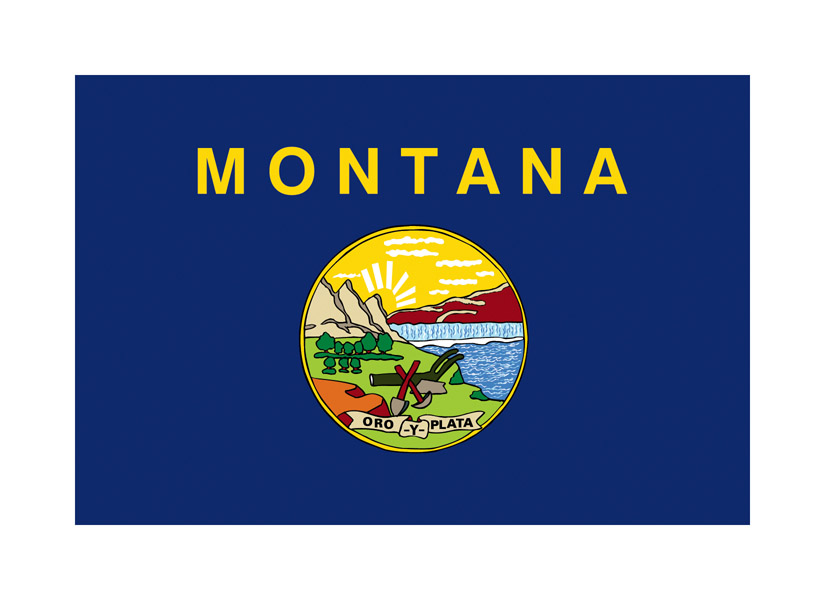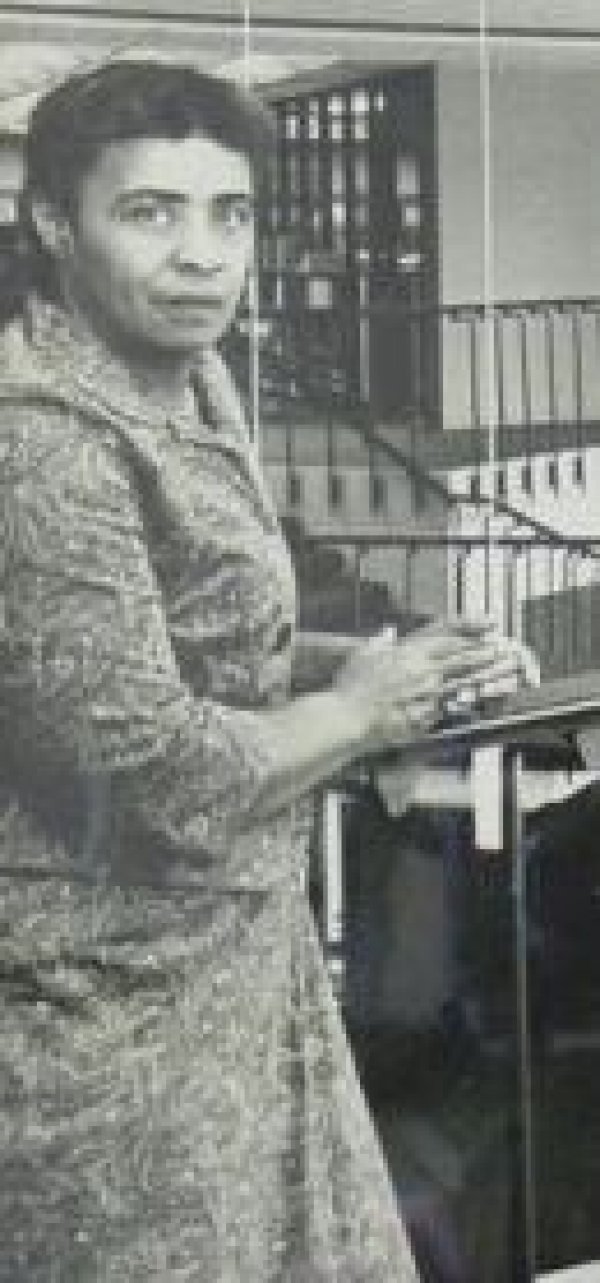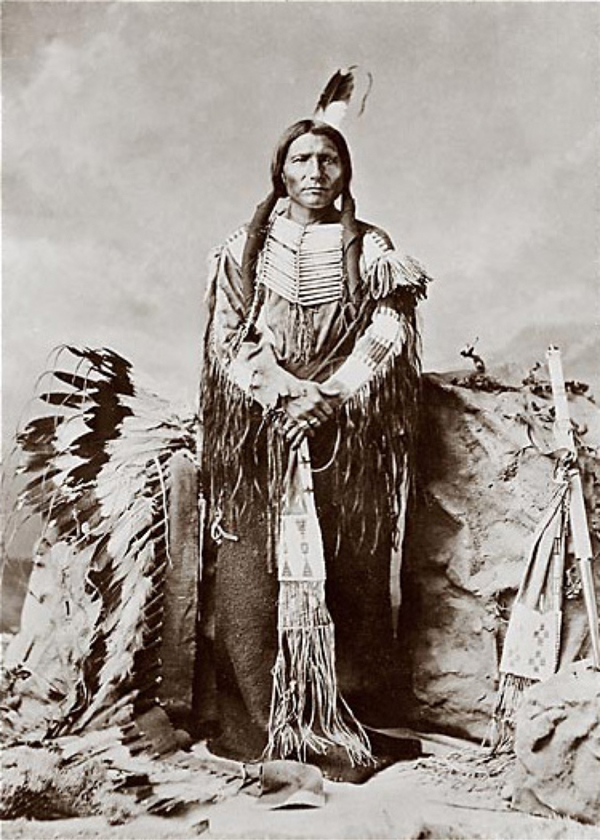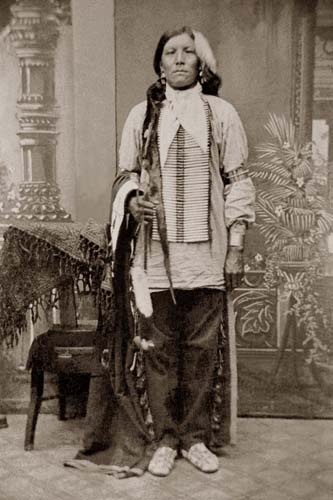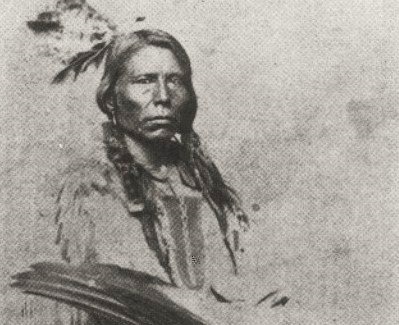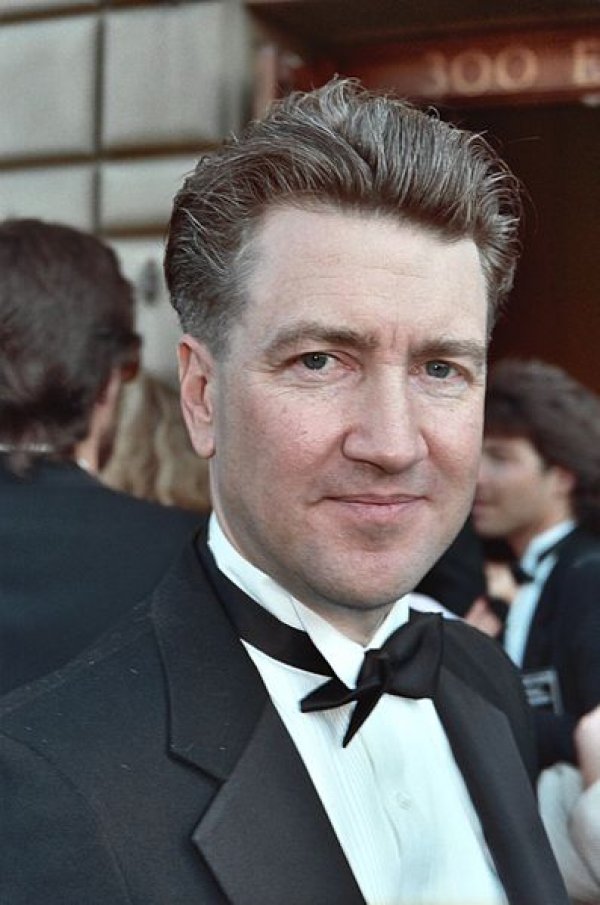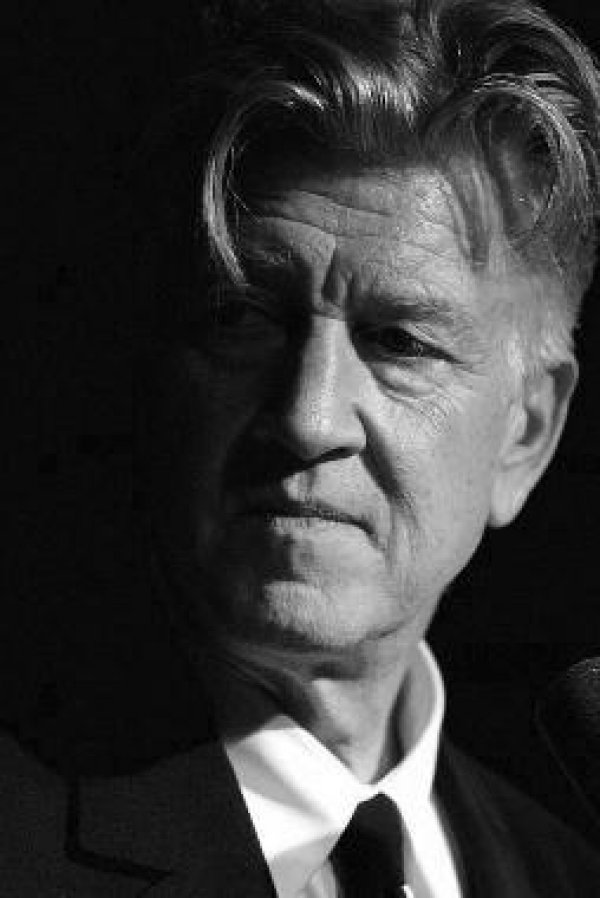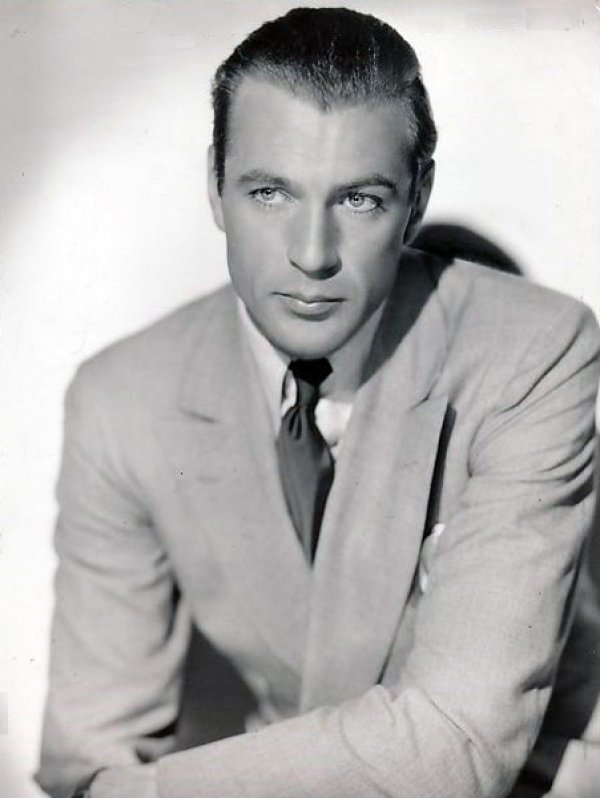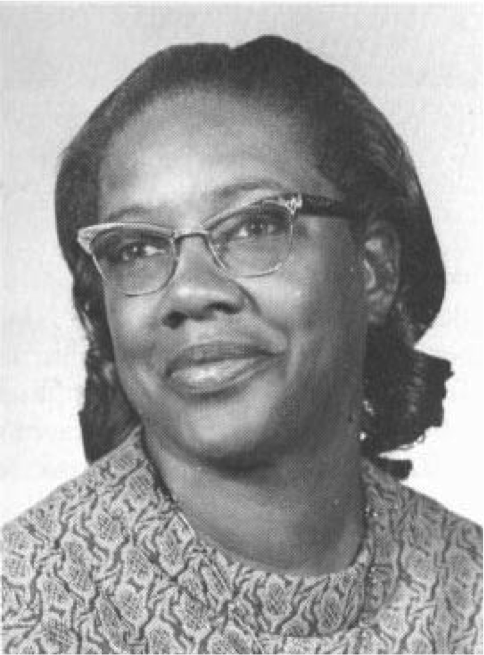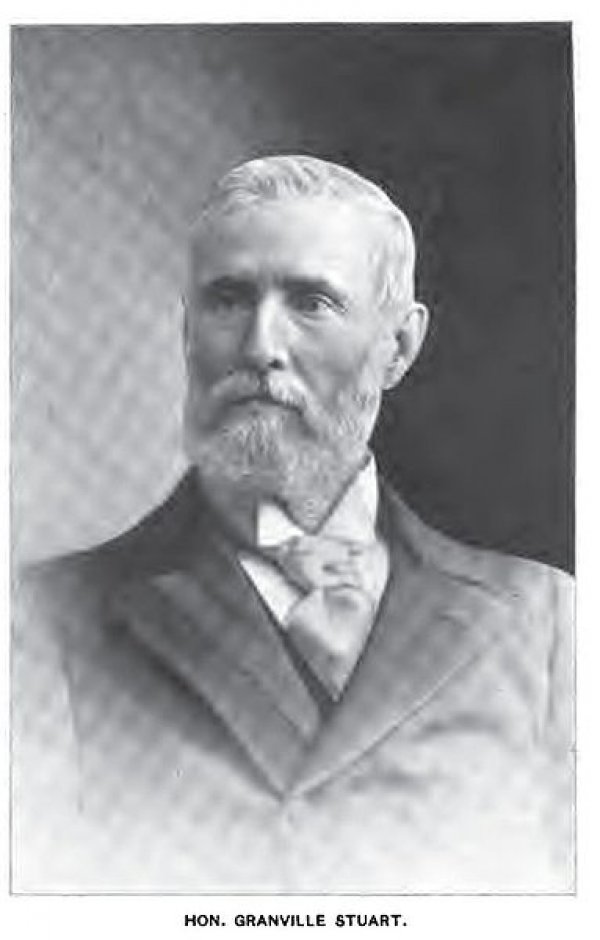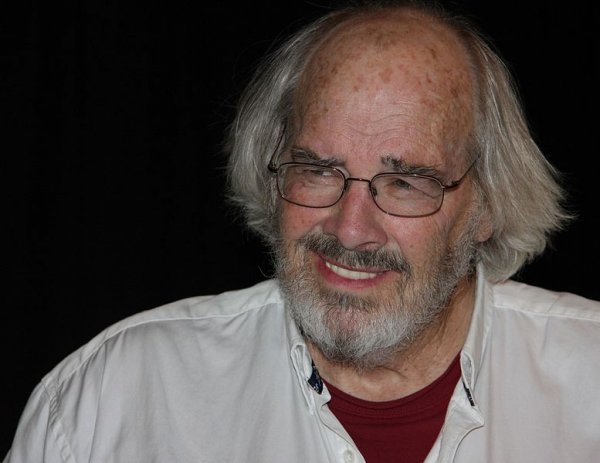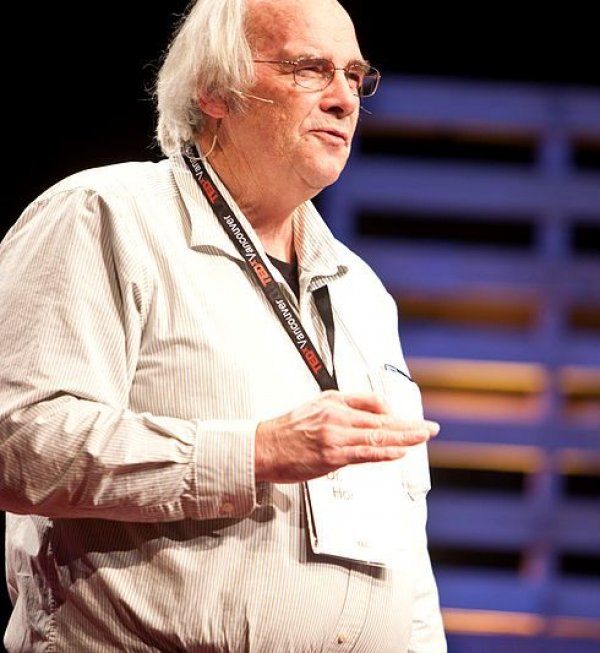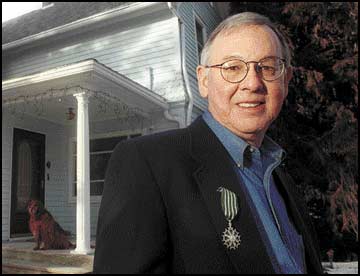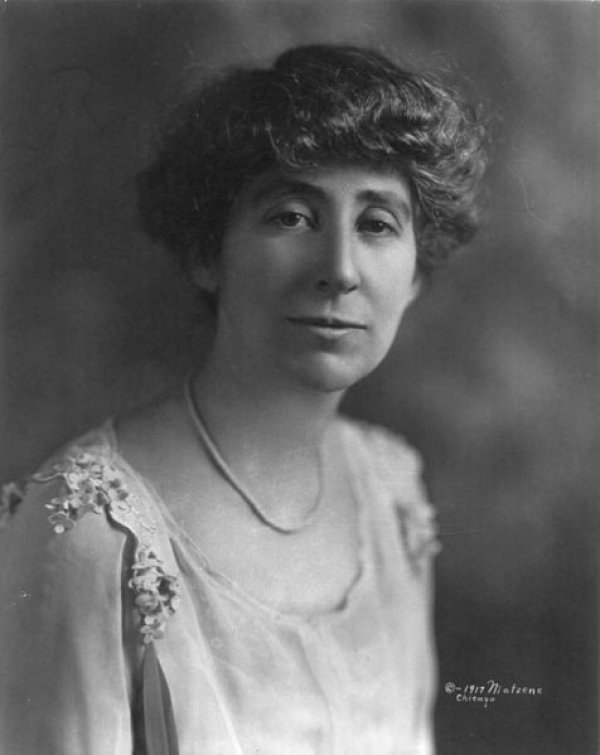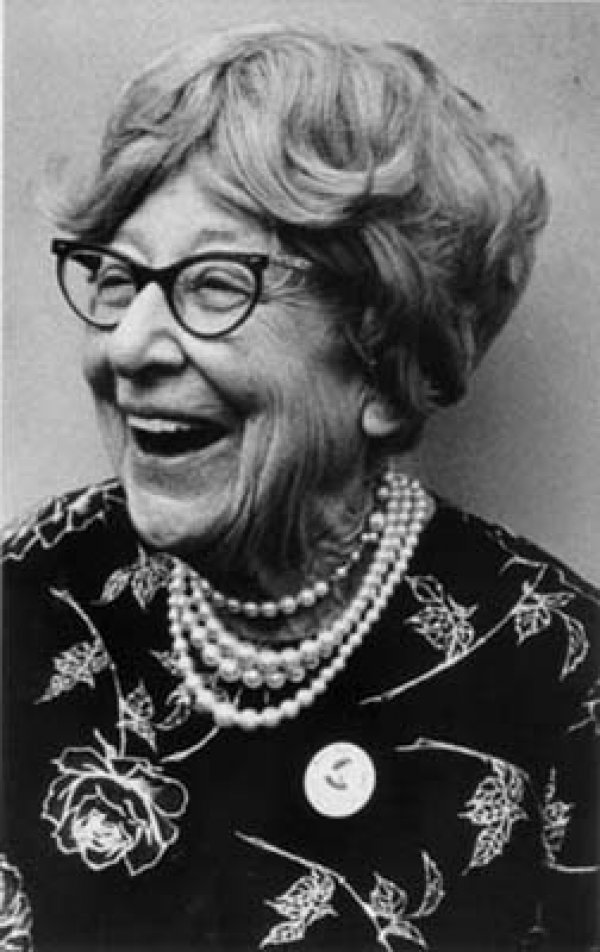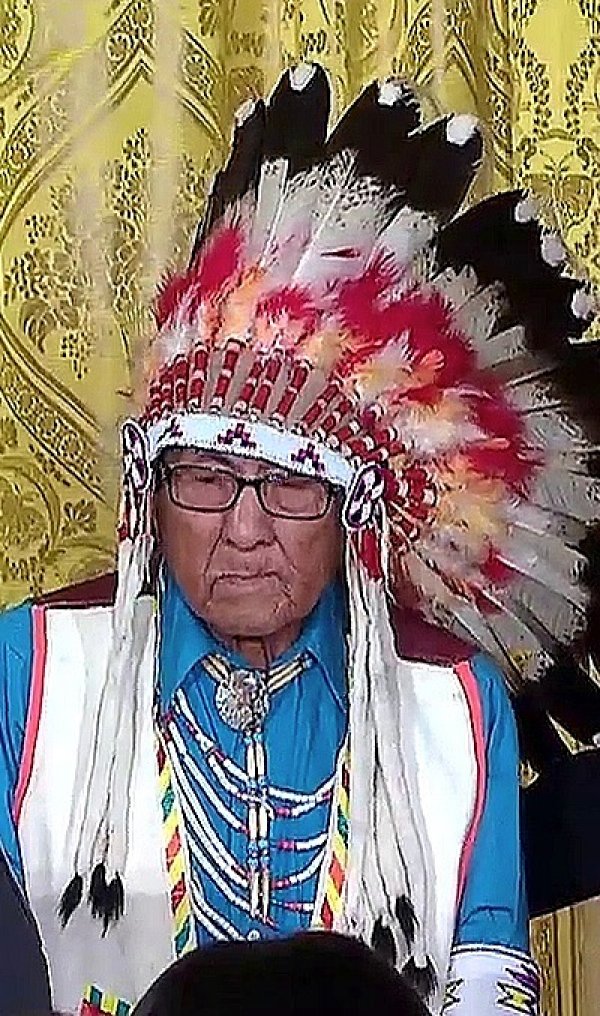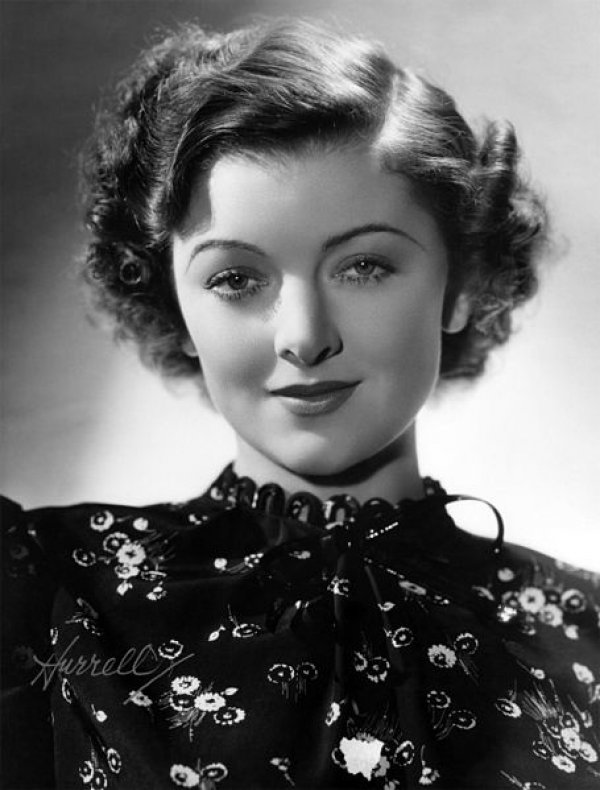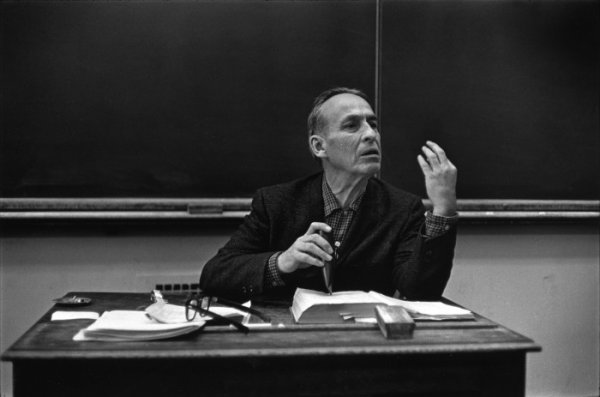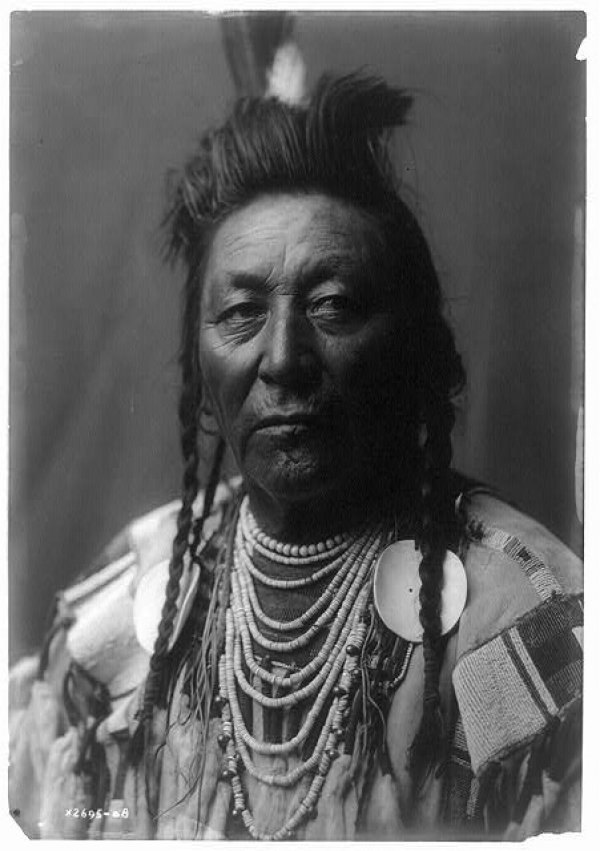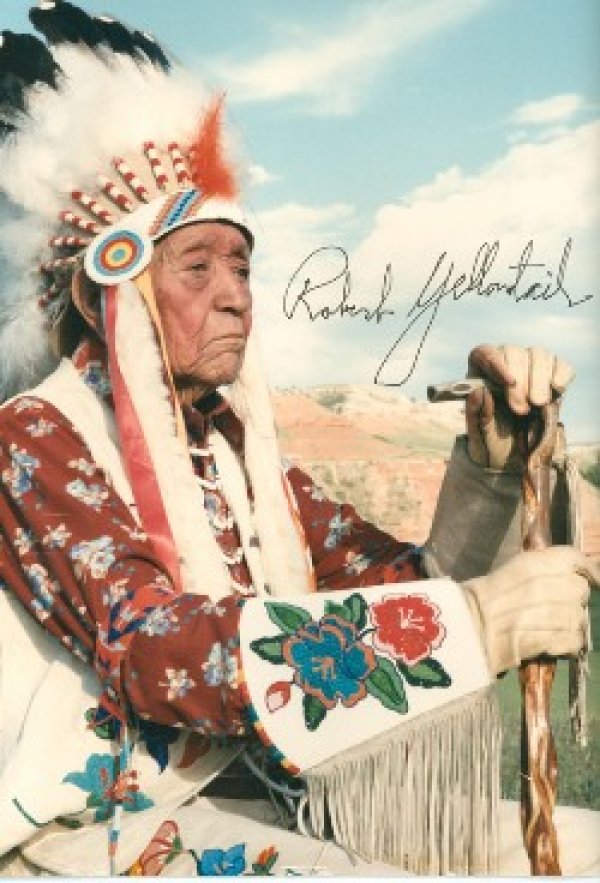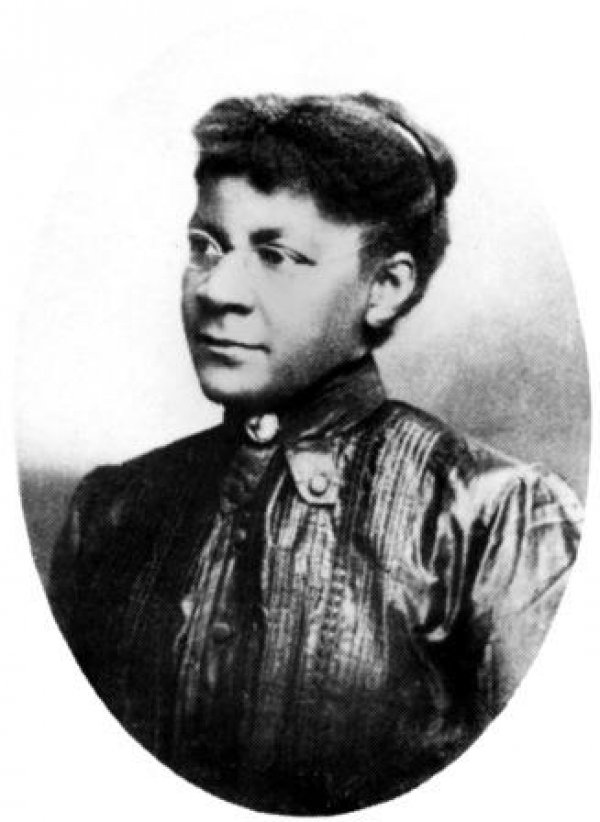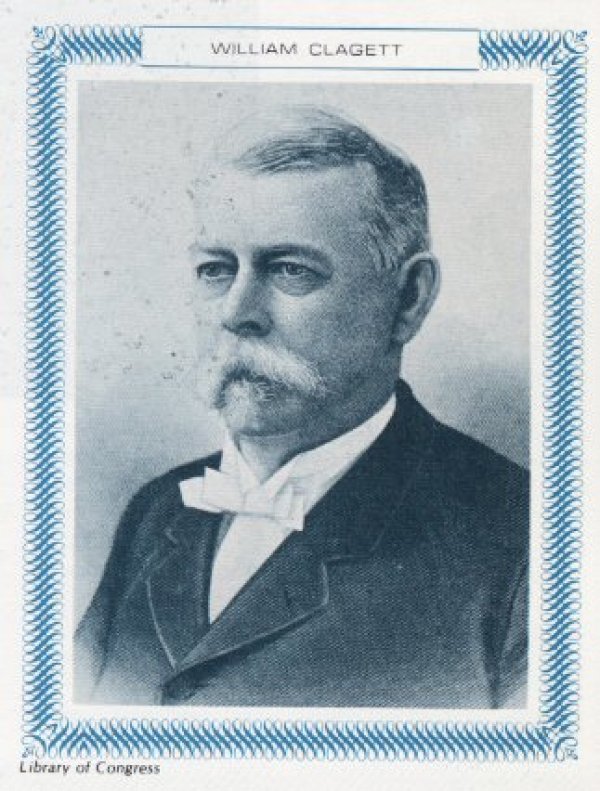The following are a number of short biographies of famous people in Montana. Biographic information on state governors, US senators, and US representatives can be found in each state’s Government and Politics section. In-depth biographies and biographic information of US presidents is available in the USA's History section.
Alma Smith Jacobs
Alma Smith Jacobs was a librarian and civil rights activist. She was the first African American state librarian of Montana.
Alma Smith was born on 1916 in Lewiston, Montana. She grew up in Great Falls, where there had been a substantial postbellum African American migration. Winning scholarships for academic merit, she graduated from Talladega College in Alabama with a degree in sociology in 1938.
After working as a traveling bookmobile librarian in the south, she completed a degree in library science from Columbia University in 1942. She married returning World War II veteran Marcus Jacobs in 1946, after a stint working as assistant librarian at Talladega College. They settled in her hometown of Great Falls, where Alma Jacobs began a nearly 30-year-long career at the Great Falls Public Library, serving as principal librarian from 1954 to 1973, and overseeing the 1967 construction of a new state-of-the-art facility.
Jacobs was active in civil rights causes, serving as the president of the Montana Federation of Colored Women’s Clubs and a member of the Montana Advisory Committee to the US Civil Rights Commission. With her sister, Lucille Smith Thompson, Jacobs worked on the 1970 volume The Negro in Montana, 1800-1945: A Selective Bibliography.
Jacobs was named Montana State Librarian in 1973, breaking barriers for African Americans in library science. As state librarian, she was active in literacy, community support, and civil rights causes, as well as in the congregation of the Union Bethel AME Church.
Jacobs died on December 18, 1997, and is buried in Great Falls, Montana.
| Date of Birth | November 21, 1916 |
|---|---|
| Place of Birth | Lewistown, Montana |
| Date of Death | December 18, 1997 |
| Place of Death | Great Falls, Montana |
| Birth Name | Alma Smith |
| Known for | First African American to serve as Montana State Librarian |
Charley Pride
Charley Pride is the first major African American Country music singer and a minor league baseball player.
Charley Frank Pride was born March 18, 1938, in Sledge, Mississippi, one of 11 children. Pride taught himself to play guitar at 14. His major aspiration, however, was to become a professional baseball player. In 1953, he started playing for a number of minor and Negro league teams but his career was interrupted from 1956 to 1958 when he served in the Army. He married Rozene Cohan in 1956 and they had three children.
In 1960, Pride moved to Helena, Montana where he the semi-professional East Helena Smelterites recruited him. The team manager recognized Pride’s singing skills and hired him to sing at games.
Pride signed to RCA record company in 1966. His song “Just Between You and Me” reached number nine on the Country music charts in 1967 and earned him his first Grammy nomination. The same year, Pride became the second African American artist to perform at the Grand Ole Opry.
Between 1967 and 1987, Pride produced 52 chart-topping hits. His first Grammy Awards were for a gospel album. After the crossover hit “Kiss an Angel Good Mornin’,” Pride won the Country Music Association’s Entertainer of the Year (1971) and Top Male Vocalist of the Year (1971 and 1972) awards. He also won a Grammy for Best Male Country Vocal Performance (1971).
Pride left RCA Records in 1986 and moved to 16th Avenue Records. He lives with his family in Dallas, Texas.
| Date of Birth | March 18, 1938 |
|---|---|
| Place of Birth | Sledge, Mississippi |
| Birth Name | Charley Frank Pride |
| Known for | Country music singer, musician |
Crazy Horse
Crazy Horse was an Oglala Lakota war leader who is known for his resistance to US encroachment on native lands and his decisive role in the 1876 Battle of the Little Bighorn.
Crazy Horse was born between 1840 and 1842 with the name Cha-O-Ha, meaning “In the Wilderness” or “Among the Trees.” Known for being reserved and aloof but a fierce fighter, his reputation as a warrior grew through the 1850s and 1860s.
In 1866, Crazy Horse and six other warriors defeated 53 US infantrymen and 27 cavalry troops by luring them into an ambush. He participated in a number of other battles with US troops leading up to the Great Sioux War of 1876–1877.
On June 17, 1876, Crazy Horse led a war party against Brigadier General George Crook’s force. The battle delayed Crook’s joining Lieutenant Colonel George Armstrong Custer and his 7th Cavalry, which would prove decisive in Custer’s defeat.
A week later on June 25, 1876, Custer ill-advisedly attacked a camp of Lakota Sioux and Cheyenne warriors, reportedly underestimating their numbers. While Crazy Horse’s exact role in the battle is uncertain, multiple eye witnesses name him among the bravest warriors of the battle.
In 1877, Crazy Horse’s warriors fought their last battle, and weakened by hunger and the cold of winter, Crazy Horse decided to surrender to save his men. During his attempted arrest in September 1877, Crazy Horse resisted a guard and was bayonetted. Crazy Horse died in Fort Robinson, Nebraska, on September 5, 1877.
| Date of Birth | c. 1840–1842 |
|---|---|
| Place of Birth | Unknown |
| Date of Death | September 5, 1877 |
| Place of Death | Fort Robinson, Nebraska |
| Birth Name | Cha-O-Ha |
| A.K.A. | Light Hair, Curly |
| Known for | War leader of the Oglala Lakota |
David Lynch
David Lynch is a director and screenwriter best known for surrealist films and for the television series Twin Peaks.
David Lynch was born on January 20, 1946, to Edwina and Donald Walton Lynch in Missoula, Montana. He studied at the School of the Museum of Fine Arts, Boston, in 1964, but dropped out after a year to travel around Europe. He planned a three-year trip, but returned to the United States after only 15 days.
Lynch enrolled at the Pennsylvania Academy of Fine Arts in 1966, where he met Peggy Reavey; the two married in 1967. Lynch began producing short films and later moved to Los Angeles, where he produced his first feature film, the surrealist horror movie Eraserhead, in 1977; it attracted a cult following. During that year, he separated from his first wife, Peggy, and married his second, Mary Fisk.
Lynch gained mainstream attention with Elephant Man, a film biography of Joseph Merrick. He created a number of films in the 1980s, with varying degrees of success. In 1990, he created Twin Peaks, a commercially successful murder mystery television series.
Lynch began to move toward surrealist filmmaking and non-linear narrative structures more decisively in the late 1990s and 2000s; some of his most important films during this time included Lost Highway, Mulholland Drive, and Inland Empire. Lynch received nominations for three Academy Awards for Best Director and one for Best Screenplay, and has won a number of other awards, including the Cannes Film Festival Palme d’Or.
| Date of Birth | January 20, 1946 |
|---|---|
| Place of Birth | Missoula, Montana |
| Date of Death | January 16, 2025 |
| Place of Death | Los Angeles, California |
| Birth Name | David Keith Lynch |
| Known for | Director and screenwriter |
Gary Cooper
Gary Cooper was an American film star with a career spanning more than three decades. For 18 years of his career, he was one of the top-earning stars in Hollywood.
Gary Cooper was born Frank James Cooper on May 7, 1901, in Helena, Montana, to Alice and Charles Henry Cooper. Both of his parents were English immigrants, and the family moved back to England in 1909, returning to the States in 1912.
Cooper dropped out of high school in 1918 to help at his father’s ranch. In 1919, he enrolled in Gallatin County High School, where his English teacher, Ida Davis, encouraged him to become involved in the school’s theater department.
In 1924, Cooper moved to Los Angeles, where he got a job as a stunt rider and film extra. From there, he won roles in a number of silent films, mostly Westerns. In 1929, he starred in his first sound film, The Virginian, earning widespread acclaim.
In 1933, Cooper had his name legally changed from Frank to Gary. Between 1925 and 1960, Cooper starred in 84 films, playing a range of heroic characters, from champions of the common man to nonviolent heroes in search of redemption. His onscreen persona was appealing to both men and women.
Cooper married Veronica Balfe in 1933 and had a daughter. He received Academy Awards for Best Actor for his work in High Noon and Sergeant York, as well as an Academy Honorary Award in 1961.
Cooper died on May 13, 1961, of cancer.
| Date of Birth | May 7, 1901 |
|---|---|
| Place of Birth | Helena, Montana |
| Date of Death | May 13, 1961 |
| Place of Death | Los Angeles, California |
| Birth Name | Frank James Cooper |
| Known for | Film actor |
Geraldine Washington Travis
Geraldine Washington Travis is a politician, civil servant, and civil rights activist. She was the first African American elected to the Montana State House of Representatives.
Geraldine Travis was born in Albany, Georgia, on September 3, 1931. After her marriage to Airman William Alexander Travis in 1949, she traveled to bases around the country, attending Xavier University in New Orleans, Louisiana, and raising the couple's five children.
The family moved to Great Falls, Montana, in 1967, with Travis' husband stationed at the nearby Malmstrom Air Force Base. Travis became interested in women's rights after experiencing the isolated and restrictive life of a military wife on-base. Travis joined local Great Falls civil rights and Democratic Party activist groups and was one of the founding members of the Great Falls branch of the NAACP, as well as a founder of the Montana Chapter of National Council of Negro Women and the Montana Women’s Political Caucus.
When Shirley Chisholm, the first African American candidate for president, ran in 1972, Travis campaigned for her as president of the Great Falls Shirley Chisholm for President Club, and she attended the 1952 Democratic National Convention as a delegate for the state of Montana.
In 1974, Travis was herself elected to serve as a Democratic member of the Montana State House of Representatives, the first African American to hold the position. Her legislation as a representative focused on issues of child welfare and unemployment compensation for federal employees. Travis lost re-election in 1976. She retired to Arizona in 1989.
| Date of Birth | September 3, 1931 |
|---|---|
| Place of Birth | Albany, Georgia |
| Birth Name | Geraldine Washington |
| Known for | First African American elected to the Montana State Legislature |
Granville Stuart
Granville Stuart was an author, businessman, rancher, civic leader, and important figure in the early history of the state of Montana.
Granville Stuart was born on August 27, 1834, in Harrison County, Virginia, to Robert and Nancy C. Stuart. The family moved to Muscatine County, Iowa in 1838.
In 1852, Granville traveled with his brother and father to California to prospect for gold; unsuccessful, the father returned to Iowa the following year, but Stuart and his brother stayed. They enlisted as scouts in the Rogue River Wars in February 1856 before making plans to return to Iowa in 1857. Granville Stuart fell ill, however, and by the time he regained his health, the winter weather was too severe to cross the Rockies.
Stuart and his brother traveled to Beaverhead Valley in what would become Montana Territory. In 1858, the brothers found gold in the Deer Lodge Valley. They settled there permanently in 1861, and a prospecting community built up around them.
In 1862, Granville Stuart married a 12-year-old Shoshone girl named Awbonnie Tookanka. In 1864, the town of Deer Lodge, Montana, was officially founded.
Stuart held a number of public offices during his career, including serving five terms in the Montana Territorial Legislative Assembly. At the age of 60, he was appointed Minister Plenipotentiary to Paraguay and Uruguay. He wrote a number of books about Montana’s early history and kept diaries and correspondence throughout his life; this documentation has become an invaluable resource in the study of the American West.
Stuart died on October 2, 1918.
| Date of Birth | August 27, 1834 |
|---|---|
| Place of Birth | Harrison County, Virginia (later West Virginia) |
| Date of Death | October 2, 1918 |
| Place of Death | Missoula, Montana |
| A.K.A. | Mr. Montana |
| Known for | Pioneer, gold prospector, politician, author |
Jack Horner
Jack Horner is a renowned paleontologist known for a number of breakthrough fossil discoveries and research into dinosaur developmental physiology.
Jack Horner was born in Shelby, Montana, on June 15, 1946. He discovered his first dinosaur fossil at the age of 8.
Horner attended the University of Montana, but did not graduate, due to dyslexia. He also served in the US Marine Corps during the Vietnam War.
In the 1970s, Horner and his research partner discovered a nesting site for a new species of dinosaur. The site contained the first dinosaur eggs ever uncovered in the Western hemisphere, as well as the first dinosaur embryos ever found. It also provided strong evidence that dinosaurs built nests and cared for their young. They named the new dinosaur Maiasaura, meaning “Good Mother Lizard.”
Horner went on to make many more important dinosaur fossil discoveries and conduct groundbreaking research into dinosaur developmental biology. In 1986, the University of Montana awarded him an Honorary Doctorate of Science. He also won a MacArthur Fellowship the same year.
Horner has served as a technical advisor for all of the Jurassic Park films and was the inspiration for Dr. Alan Grant, one of the leads. Throughout his career, Horner published six books for a popular audience as well as more than 100 academic articles. He currently curates the paleontology exhibits at the Museum of the Rockies, serves as an adjunct curator at the National Museum of Natural History, and teaches at Montana State University.
| Date of Birth | June 15, 1946 |
|---|---|
| Place of Birth | Shelby, Montana |
| Birth Name | John R. Horner |
| Known for | Paleontologist |
James Welch
James Welch was a member of the Blackfeet American Indian tribe, a major poet and novelist in the Native American Renaissance literary movement.
James Welch was born on November 18, 1940, in Browning, Montana, with Blackfeet and Gros Ventre Indian as well as Irish ancestry. He was raised on the Blackfeet and Fort Belknap reservations, also spending time in Minnesota, Oregon, and what is now Alaska with his itinerant rancher father.
Welch graduated from high school in Minneapolis, Minnesota, in 1958. He attended the University of Minnesota and Northern Montana University, completing a bachelor's degree at the University of Montana in Missoula in 1964. He pursued further study at Missoula, working under poet Richard Hugo; it was there he met his wife, Dr. Lois Monk.
Before finding literary success, Welch worked as a firefighter with the US Forestry Service, a counselor, and a laborer. His first novel, Winter in the Blood, set on a reservation in Montana, was published in 1974; the book's success gained Welch a place in the emergent Native American literary movement, and he went on to publish several further novels, as well as several volumes of poetry.
His collaboration with Paul Stekler on the PBS documentary “Last Stand at Little Bighorn” led to the publication of his nonfiction work Killing Custer (1994). A visiting professor at the University of Washington and Cornell University, Welch also received honorary degrees from the University of Montana, Montana State University, and Rocky Mountain College.
Welch died on August 4, 2003, in Missoula, Montana.
| Date of Birth | November 18, 1940 |
|---|---|
| Place of Birth | Browning, Montana |
| Date of Death | August 4, 2003 |
| Place of Death | Missoula, Montana |
| Known for | Native American novelist, poet |
Jeannette Rankin
Jeannette Rankin was the first woman to serve in the US Congress. She fought for pacifist causes and women's suffrage, and was involved in the passage of the 19th Amendment, giving women in the US the right to vote.
Jeannette Pickering Rankin was born on Jun 11, 1880, near Missoula, Montana. After earning a degree in biology from Montana State University in 1902, Rankin found her calling in the women's suffrage movement. A lobbyist for the National American Woman Suffrage Association, she was involved in the amendment of the Washington state constitution to give women the right to vote in 1911 and spearheaded a similar movement in Montana, passing an amendment in 1914.
Two years later in 1916, Rankin became the first woman to serve in Congress after a successful run for the US House of Representatives. As a progressive Republican representative for Montana, she voted against the US entering World War I and supported women's rights legislation, including the 19th Amendment.
After the end of her term in 1919, Rankin served as a delegate to the Women's International Conference for Peace in Switzerland and was active in the Women's International League for Peace and Freedom. She was elected to the House of Representatives again in 1939, serving until 1943; due to the timing of her two non-consecutive terms, Rankin was the only congressperson to vote against both World Wars. She later spoke against US military actions in Korea and Vietnam.
Rankin died on May 18, 1973, in Carmel, California.
| Date of Birth | June 11, 1880 |
|---|---|
| Place of Birth | Missoula County, Montana |
| Date of Death | May 18, 1973 |
| Place of Death | Carmel, California |
| Birth Name | Jeannette Pickering Rankin |
| Known for | Member of the US House of Representatives from Montana |
Joe Medicine Crow
Joe Medicine Crow was a tribal historian, anthropologist, and war chief who is best known for being the last war chief of the Crow tribe and, prior to his death, the last living Plains Indian war chief.
Joseph Medicine Crow was born on the Crow Indian Reservation, Montana, on October 27, 1913. As a descendant of an eyewitness to the Battle of the Little Bighorn, Medicine Crow grew up hearing stories of the infamous battle, an experience that would inspire his decision to become a tribal historian.
A quick student with a sharp intellect, Medicine Crow began attending college classes while still in the eighth grade, ultimately earning his bachelor’s degree in 1938. He became the first member of the Crow people to earn a master’s degree and was working toward his doctorate at the outset of WWII, when he left school to join the US Army. As a scout in the 103rd Infantry Division, he successfully carried dynamite through enemy gunfire and single-handedly stole 50 horses from German SS officers by sneaking into the stable at dawn and riding off on the finest horse as the others followed, singing a Crow victory song as he sped along.
Only upon his return to Montana did Medicine Crow realize his various deeds met the Crow’s four requirements for becoming a war chief. He was much-awarded during his lifetime, receiving the Bronze Star and Legion of Honor after his WWII exploits and Presidential Medal of Freedom in 2009.
Crow died aged 102 in Billings, Montana, on April 3, 2016.
| Date of Birth | October 27, 1913 |
|---|---|
| Place of Birth | Near Lodge Grass, Montana |
| Date of Death | April 3, 2016 |
| Birth Name | Joseph Medicine Crow |
| Known for | Crow historian and author, Plains Indian war chief, founding member of the Traditional Circle of Indian Elders & Youth |
Myrna Loy
Myrna Loy was an actress featured in 129 movies, including all six of The Thin Man movies.
Myrna Loy was born Myrna Adele Williams on August 2, 1905, to Adelle Mae and David Granklin Williams near Radersburg, Montana. At the age of 13, after her father’s death, Myrna relocated to Los Angeles with her mother and brother.
She started appearing in local theater productions at the age of 15. She left school at 18 to support her family. Warner Bros. noticed her in a small movie role and offered her a contract; she changed her last name from Williams to Loy.
She was typecast as “exotic” even though she was white, and frequently played characters of Asian descent, as well as femme fatales. She won the role of Nora Charles for the 1934 movie The Thin Man opposite William Powell; the two had excellent on-screen chemistry and went on to film many more movies together.
Loy was a fierce advocate against Nazism during World War II and was an advocate for African American actors in Hollywood throughout her career; she worked as co-chairman of the Advisory Council of the National Committee Against Discrimination in Housing during her later years.
Loy became the first Hollywood celebrity to serve as a member of the US National Commission for UNESCO in 1948. She won a Kennedy Center Lifetime Achievement Award in 1988. In 1991, she won an Academy Honorary Award.
Loy died on December 14, 1993, of complications from surgery.
| Date of Birth | August 2, 1905 |
|---|---|
| Place of Birth | Helena, Montana |
| Date of Death | December 14, 1993 |
| Place of Death | New York, New York |
| Birth Name | Myrna Adele Williams |
Norman Maclean
Norman Maclean was an academic and author, best known for his books Young Men and Fire and A River Runs Through It and Other Stories.
Norman Maclean was born on December 23, 1902, to Clara Evelyn and Reverend John Norman Maclean in Clarinda, Iowa. His family moved to Missoula, Montana, in 1909. His youth in Montana profoundly influenced his later work, including A River Runs Through It and Other Stories. As a young man, he found work in logging camps and in the United States Forest Service in northwestern Montana.
Maclean later enrolled at Dartmouth College, graduating in 1924; he stayed on as a teacher in Hanover, New Hampshire until 1926. In 1931, he married Jessie Burns; the couple later had two children. He earned a doctoral degree in English from the University of Chicago in 1940.
Maclean retired in 1973 after a successful career in academia and, encouraged by his children, began writing A River Runs Through It and Other Stories. It was published to widespread literary and commercial success and nominated for a Pulitzer Prize in 1977. In 1992, the book was adapted into a movie, directed by Robert Redford.
Maclean later worked on Young Men and Fire, a nonfiction account of the Mann Gulch forest fire of 1949, but did not complete it before his death on August 2, 1990. The book was published after his death and won a National Book Critics Circle Award in 1992.
| Date of Birth | December 23, 1902 |
|---|---|
| Place of Birth | Clarinda, Iowa |
| Date of Death | August 2, 1990 |
| Place of Death | Chicago, Illinois |
| Birth Name | Norman Fitzroy Maclean |
| Known for | Author |
Plenty Coups
Plenty Coups was a chief of the Mountain Crows of the Crow Nation and a renowned Native American leader.
Plenty Coups was born in 1848 to the Mountain Crow tribe near what is now Billings, Montana, to Medicine Bird and Otter Woman. His name at birth was Chíilaphuchissaaleesh, or “Buffalo Bull Facing the Wind.”
At the age of 11, he had a prophetic dream that told him that the only way to preserve his people was to learn to cooperate with the white government. This dream would guide him for the rest of his life, profoundly influencing his actions as chief.
Coups' grandfather, predicting he would become an important leader, gave him the name Alaxchiiaahush, or “Many Achievements.” White people translated this as “Plenty Coups” from the word “coup,” meaning acts of valor.
As a young man, Plenty Coups earned renown as a warrior, participating in raids against neighboring tribes including the Cheyenne and the Sioux, and quickly established himself as a tribal leader. In 1876, at the age of 28, he was named chief of the Mountain Crow. He traveled to Washington, DC, numerous times to fight to preserve Crow tribal land, managing to save approximately 80 percent of the traditional territory and spare his people from relocating to a reservation.
Throughout his life, Plenty Coups was a formidable diplomat as well as warrior and leader, managing to shield the Crow people and their way of life to a greater degree than the leaders of other Native American tribes were able to. He died in 1932.
| Date of Birth | 1848 |
|---|---|
| Place of Birth | The-cliffs-that-have-no-name (possibly near Billings, Montana) |
| Date of Death | 1932 |
| Place of Death | Chief Plenty Coups (Alek-Chea-Ahoosh) State Park and Home, Crow Indian Reservation, Montana |
| Birth Name | Chíilaphuchissaaleesh (Buffalo Bull Facing the Wind) |
| A.K.A. | Alaxchíia Ahú |
| Known for | Principal chief of the Mountain Crows (the Apsáalooke) |
Robert Yellowtail
Robert Yellowtail was a Crow Indian activist and politician.
Robert Summers Yellowtail was born on an unknown date in 1889 on the Crow Indian Reservation near Lodge Grass, Montana. He was sent to an assimilationist reservation school and later attended a government-operated boarding school in Riverside, California.
After graduating in 1907, Yellowtail returned to Montana. He married Clara Spotted Horse, the daughter of a prominent reservation leader, in 1911, and began serving as a district representative on the Crow tribal business committee, working to negotiate land usage rights between Crow and white ranchers.
Over the next decade, Yellowtail would be a part of several Crow delegations to Washington, DC, to defend Crow rights. He generally supported reservation independence and clashed with the Bureau of Indian Affairs, but he also supported the 1920 Crow Act, a position that put him at odds with tribal leaders.
Yellowtail ran unsuccessfully for Congress as an independent candidate in 1926. After the death of his wife, Yellowtail married Lillian Bull Shows Hogan; the marriage ended in divorce, and Yellowtail married Margaret Pickett in 1932.
Yellowtail's 1934 appointment as superintendent of the Crow Reservation was a radical step for Native self-governance, making him the first Indian to hold such a position on a home reservation. In 1948, he was elected tribal chairman; he was re-elected in 1952.
Yellowtail married his fourth wife, Dorothy Payne, in 1960. He was featured in a 1985 historical documentary, Contrary Warriors.
Yellowtail died on June 18, 1988, on the Crow Reservation.
| Date of Birth | August 4, 1889 |
|---|---|
| Place of Birth | Lodge Grass, Montana |
| Date of Death | June 20, 1988 |
| Birth Name | Robert Summers Yellowtail |
| Known for | Crow Nation leader, first Native American to hold the post of Agency Superintendent at a reservation |
Sarah Bickford
Sarah Bickford was a businesswoman who became the owner of the Virginia City Water Company.
Sarah Bickford was born in approximately 1852. Because she was born into slavery, the specific details of her birth are not well documented. She may have been born in Jonesboro, Tennessee, to a woman owned by John Blair III, a politician who had become rich in the California Gold Rush of 1849.
When Blair died in 1863 and his estate was settled, Bickford's parents were sold, and that was the last she saw of them. She moved to Montana Territory in 1871, working as a nanny in exchange for free passage.
Bickford married John Brown, a miner, in 1872. She had three children with Brown; two did not survive childhood. Brown was abusive, and Sarah sued for divorce and custody of her remaining child, Eva, in 1880. After divorcing her husband, she opened the New City Bakery and Restaurant. Her daughter, Eva, died in 1882 at the age of 11.
Bickford married Stephen Bickford, a white farmer and miner, in 1883. The couple had four children together, and jointly owned two-thirds of the Virginia City Waterworks, the local utility. Stephen died in 1890, leaving Sarah with sole responsibility for the Waterworks. She took correspondence business classes and purchased the rest of the Waterworks the same year, running it as a respected member of the community for the rest of her life.
Bickford died on July 19, 1931.
| Date of Birth | c. 1852 |
|---|---|
| Place of Birth | North Carolina or Jonesboro, Tennessee |
| Date of Death | 1931 |
| Place of Death | Virginia City, Montana |
| Birth Name | Sarah Gammon Brown Bickford |
| Known for | Owner of the Virginia City Water Company, first woman owner of a utility |
William H. Clagett
William Clagett was a lawyer and politician who is notable for introducing the legislation that led to the creation of Yellowstone National Park.
William Horace Clagett was born on September 21, 1838, in Upper Marlboro, Maryland. In 1850, he settled in the town of Keokuk, Iowa, with his father. After attending public schools, Clagett studied law in Albany, New York, and was admitted to the Keokuk bar in 1858.
In 1861 Clagett moved to Carson City, Nevada, where he married Mary Hart, relocating to Humboldt, Nevada, in 1862. There, Clagett continued to practice law before being elected a Republican member of the Nevada Territorial House of Representatives in 1862 and a member of the Nevada Assembly in 1864.
Clagett moved to Montana in 1865 and was elected to the US House of Representatives for the Montana Territory in 1870. Based on findings from the recent Hayden Geological Survey in 1871, Clagett introduced an act establishing Yellowstone National Park as a wilderness preserve. A rock formation in the park, Clagett Butte, is named in his honor.
Clagett did not win re-election in 1872 and resumed his law practice in the northwestern United States, variously working from Deer Lodge, Montana; Denver, Colorado; Deadwood, South Dakota; Portland, Oregon; and Coeur d'Alene, Idaho. Clagett served as president of the Idaho constitutional convention in 1889 and ran unsuccessfully for the US Senate in 1891 and 1895. He retired to Spokane, Washington, where he practiced law until his death on August 3, 1901.
| Date of Birth | September 21, 1838 |
|---|---|
| Place of Birth | Upper Marlboro, Maryland |
| Date of Death | August 3, 1901 |
| Place of Death | Spokane, Washington |
| Known for | Member of the US House of Representatives from the Montana Territory, introduced the Act of Dedication bill that led to the creation of Yellowstone National Park, member of the Nevada Territorial House of Representatives |
Copyright © 1993-2025 World Trade Press. All rights reserved.


